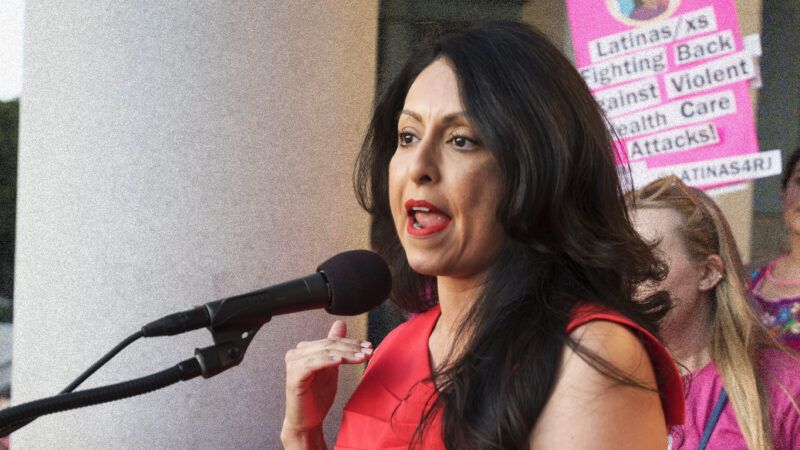Los Angeles City Council Scandal Highlights Ugly Influence of Big Labor
Having a city council secretly dominated by people with racist views is troubling, but having an entire political system controlled by one special interest group is also scandalous.

By now, most of us have read about the recorded conversation of Los Angeles County council insiders making mean-spirited and bigoted comments about Blacks, whites, gays, Jews, Armenians, and indigenous peoples as they complained about the new redistricting maps that a city commission had recently proposed. It's appalling—and we're just beginning to see the fallout.
Now-resigned Council President Nury Martinez and her colleagues (Council members Gil Cedillo and Kevin de León and former labor leader Ron Herrera) seemed hostile to everyone who wasn't in their little clique, viewing them as a threat to their political power. But what constitutes membership in that group?
That's where this story becomes more fascinating and sinister. Los Angeles is an overwhelmingly Latino city (and there's obviously no single Latino point of view, as Martinez's mocking of Oaxacans made clear), so the idea that this group broadly represents Latino interests is preposterous. In reality, these officials represent one faction, highlighted by the location of the clandestine meeting.
It took place in an office at the Los Angeles County Federation of Labor—"an umbrella group for 300 labor unions and 800,000 workers that wields tremendous and sometimes controversial sway in the city," as The Los Angeles Times explained. We got a sneak peek, as top lawmakers were sitting with union brass talking about carving up districts to enhance their power and dilute the power of other ethnic and political blocks.
I've been a critic of It's almost hard to believe, but California was once known as the state with premier public services. Under the leadership of Democratic Gov. Pat Brown, California built top universities (with free tuition for residents), expansive freeways, fabulous schools, and advanced water infrastructure.
Now, these investments are in shambles, with the state having among the nation's worst schools, most congested freeways, persistent water shortages, the highest tax rates, the worst business climate, the largest bureaucracies, the highest pension debt, and most meddlesome regulations. One can peruse any number of national rankings and find California reliably at the bottom of them.
How did we get here? There are many reasons, but Brown's son, Jerry Brown, during his first stint as governor in the 1970s signed laws giving collective-bargaining power to state employees and employees at public schools, colleges and universities. Gov. Ronald Reagan signed a law giving city and county employees the right to collectively bargain. Over the years, lawmakers kept bolstering these unions' power.
"Democratic politicians routinely visit the offices of 'the Fed' on James M. Woods Boulevard to seek favors from labor unions and arrange campaign help," the Times added, referring to the now-infamous Los Angeles meeting. That's an understatement. The federation of labor, which represents private and public union members, was not just one interest group—it was in cahoots with the leadership.
In the state Capitol, the unions—and especially public-sector unions such as the California Teachers' Association, various law-enforcement, and firefighting unions and the SEIU—aren't just among the normal group of lobbying interests. They control the building and elect lawmakers who come from their ranks. And you wonder why public services or government contracting never are reformed?
"There is no special interest in California that wields more influence over state and local politics than public sector unions," noted the California Policy Center's Edward Ring. "From the office of the governor to a school board managing a district with only a few hundred students, public sector unions are omnipresent.…(T)o defy their agenda is certain political suicide." He says they spend hundreds of millions of dollars per two-year election cycle.
In the Orange County race for supervisor, the deputies' union is spending around $87,000 a week on cable ads depicting the even-tempered and moderate-to-conservative Republican Pat Bates as an "extremist." The Orange County Employees' Association, which represents county government workers, recently dropped $50,000 on a mailer touting Bates' progressive Democratic opponent, Katrina Foley. This is just the tip of the iceberg.
In Riverside County, unions are targeting Libertarian Supervisor Jeff Hewitt. Hewitt previously angered firefighters with his efforts to create a city-run fire department in Calimesa. He also opposed the board's decision to boost deputy pay. Campaign spending is part of the system—but at the local level candidates who don't do union bidding struggle against daunting odds.
Opposing local cops and firefighter spending priorities is, as Ring said, political suicide, which is why most politicians—including Republicans—simply roll over. Having a city council secretly dominated by people with such awful views is troubling, but having an entire political system controlled by one special interest group is also scandalous.
This column was first published in The Orange County Register.


Show Comments (54)